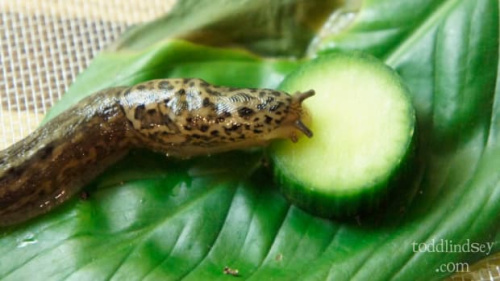Care for Slugs
If you are looking for an unusual pet, you can remove a slug from outside and keep it as a pet. Slugs are easy to care for and they are good for both older and younger kids. This helps your kids gain responsibility. You can keep a slug in an aquarium. Slugs feed off of plants, such as fruits and vegetables. Keep in mind slugs are very sensitive to chemicals, so keep them away from things like hairsprays and tap water. Slugs generally live between one and five years.
Contents
Steps
Providing a Habitat
- Find the right container. Slugs generally do well in aquariums. An aquarium should be at least 20 centimeters by 20 centimeters (8 by 8 inches). You can buy an aquarium online or at a pet store.
- Make sure to provide proper ventilation. The lid should have holes for ventilation. Something like a mesh lid, for example, would work well.
- Slugs are very small, especially in comparison to reptiles that are usually kept in aquariums. Examine ventilation holes carefully and make sure a slug cannot creep out of these holes.
- Provide substrate. It's best to use soil, grass, and leaves from outdoors for substrate. If you took the slug from outdoors, use soil, leaves, and grass from the area where you found it. Make sure to sift through soil before adding it to your aquarium to remove any bugs.
- Once a week, remove your slug and put it in a safe container with air holes. Remove the substrate and then replace it.
- Invest in aquarium supplies. Slugs may benefit from certain aquarium supplies such as fake plants and leaves. You can also bring in real material from outside, such as twigs, for slugs to climb on.
- If you bring anything in from outside, make sure to inspect it carefully before putting it in your slug's tank.
- Clean the aquarium regularly. Once every three months, clean the slug's enclosure when you remove and replace the substrate. You can rinse things like twigs and aquarium supplies in water and then let them air dry outside. If twigs get soggy or soft in response to water, replace them with new twigs.
- Slugs are very sensitive to chemicals. You should refrain from washing anything with soap. You should only use water to rinse cage supplies.
- Slugs are sensitive to tap water, so opt for distilled water.
Feeding Your Slug
- Provide rinsed fruits and vegetables. Slugs feed off of plants. You can give them leftover fruits and vegetables from your kitchen. You can also give them fresh fruits and vegetables, as long as you rinse them in distilled water first. It's important to remove pesticides before feeding plants to your slugs.
- If possible, opt for organic fruits that do not make use of pesticides.
- In general, feed your slugs more vegetables than fruits. Slugs can die from consuming too much sugar, even natural sugar from fruits.
- Add plants and leaves for food. Slugs also feed off of plants they find outside. Add things like old leaves, grass, and other plants you find outside. Slugs feed on decaying plant matter, so if you have a plant that's dying you can feed it to your slug.
- Remove uneaten food every day. Slugs may not eat everything you leave for them. Uneaten food, especially fruit, can attract fruit flies. Fruit flies can threaten a slug's heath, so remove uneaten food at the end of each day. This will minimize exposure to bugs and keep your slugs safe.
- Use a spray bottle, not a water dish. Slugs do not need a separate water dish, just a moist environment. You should therefore spray the enclosure with a water bottle each day. You should use filtered water, as tap water can be harmful for slugs. It's important to keep a slug's environment moist so they can absorb the water they need.
Avoiding Common Mistakes
- Do not use certain sprays around your slug. Slugs are very sensitive to chemicals and absorb sprays through their skin. Do not use hairspray or aerosol sprays in the same room where you keep your slugs. This can cause them to die.
- Avoid handling your slug. Slugs should not be handled too often. Only handle them when you need to remove them from the tank for cleaning. Slugs dislike being handled and chemicals on your hands from things like lotions and soaps can be harmful to slugs.
- Spritz the aquarium with distilled water regularly. Slugs need a moist environment to thrive. Each day, spritz the inside of your slug's cage with a water bottle filled with distilled after. Slugs may die if an environment is not adequately moist.
- It's very important to use distilled water. The chemicals found in tap water can kill slugs.
Tips
- Slugs enjoy shady areas, so don't place the enclosure in direct sunlight. Provide hiding places, like a piece of bark.
- You can give them kitchen scraps of vegetables/fruits, provided they don't have pesticides.
Warnings
- Always wash your hands before you pick up the slug. There may be things like salt on them which can be harmful to it.
- Slugs can climb up walls, so use a lid and ensure the air holes in the aquarium are not big enough for a slug to crawl through.
Things You'll Need
- An aquarium
- Vegetables and fruits
- Spray bottle
- Spring or de-chlorinated tap water
- Soil
